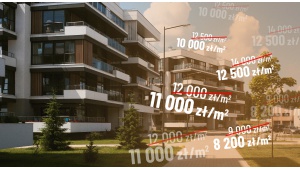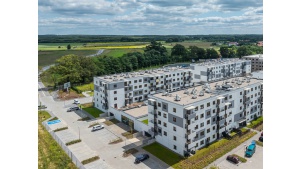Savills IM identifies real estate opportunities
Central business district (CBD) offices, supermarkets and food-anchored retail parks as well as logistics assets in key locations across Europe will present attractive investment opportunities in 2021 as investors regain confidence following the COVID-19 crisis, according to Savills Investment Management (Savills IM), the international real estate investment manager.
While containing the spread of the pandemic will remain the focal point, other challenges also lie ahead in 2021. The impact of the UK leaving the EU will come into full effect. Climate-related risks, rising inequalities and continuous geopolitical tensions likewise remain, all of which could threaten global stability. Embracing disruption to protect existing portfolios and identify new investment opportunities is, therefore, ever more important. Part of this involves capitalising on structural trends that have accelerated as a result of COVID-19.
Savills IM’s 2021 Outlook report, titled “Building resilience in global real estate portfolios”, envisages no major demise of the office sector despite the increase in agile working driven by the pandemic. Offices in CBD locations with good transport links are here to stay while the resilient income streams of food retail assets represent a strong buy for core/core-plus investors. Logistics, which has been a clear winner throughout the pandemic because of the increase in online shopping, will continue to be backed by solid fundamentals and structural tailwinds, the report emphasises. But with returns on traditional property assets – office, industrial and retail – low, investors are also looking to alternative sectors such as student housing, build-to-rent accommodation and senior living.
New research1 included in the report shows that 59% of real estate investors globally expect real estate markets in Europe to recover in 2021, with just over half (52%) expecting the recovery to begin between Q2 and Q4 next year. Some 45% of investors expect that real estate investment will increase over the next 12 months, and 25% expect investment levels to stay the same
Andreas Trumpp, Head of Research, Europe, Savills IM, commented:
“Our research shows that real estate investors are confident about 2021, and recent positive announcements about the availability of a vaccine could certainly accelerate the recovery, boost sentiment and help cross-border investments to flow again.
“The pandemic has clearly caused multiple disruptions in the economy and the commercial real estate markets. Nevertheless, in seeking new opportunities, investors should embrace the structural trends that have accelerated because of COVID-19.”
Poland
Mid- to long-term prospects for Poland’s commercial real estate market remain positive as the fundamental drivers of the country’s economic success story remain intact. Above-average infrastructure spending, foreign direct investments, domestic demand growth and economic competitiveness continue to underlie the attractiveness of the real estate market in Poland.
Poland remains one of the most sought-after logistics markets in Europe. Despite the pandemic, a high degree of liquidity and popularity is fuelling transaction volumes and is keeping pricing of warehouse facilities keen or stable. Given stable occupier demand, the supply-side risk is moderate. Investors on the Polish market are increasingly joining up with developers in forward fundings to secure assets. Savills IM expects this trend to keep up in the coming months. Moreover, owing to the development of infrastructure and transport links, the markets of northern, western and eastern Poland will gain in importance. Savills IM also expects the progressive specialization of investors in dedicated logistics strategies.
On the other hand, the office market, as in other countries, is facing the challenges caused by the pandemic. The expected weaker occupier demand, the tenants’ reluctance to enter into long-term contractual obligations under conditions of uncertainty about the future work model, the impact of the pandemic on rent stability, competition from subleases or growing incentive packages will affect the levels of return from this asset class in the short term. However, fundamental factors, including labour costs, remain more appealing in Poland than in the expensive Western European markets, which translates into good long-term prospects for the office sector. Savills IM envisages that pricing for core assets will move out slightly by 25-50 basis points, while the yield spread between Warsaw and key regional markets may decrease.
Apart from the hotel sector, the retail sector in Poland has suffered the most as a result of the pandemic. Therefore, Savills IM expects the repricing of retail facilities apart from the prime ones. This is caused by the anticipated drop in demand from tenants, change in shopping habits, dynamic growth in online sales and pressure on lower rents. Outlet centres and food-anchored retail parks are the most attractive subsectors with the best growth prospects.
As can be concluded from Savills IM’s 2021 Outlook report, the dynamically growing market of institutional living sector deserves a focus. Higher rates of return compared to Western Europe, the fundamental scarcity of quality housing and lack of access to easy financing, combined with the initial phase of market development and the expected change in approach to real estate ownership, increase the attractiveness of this asset class for investors ready for a slightly higher risk profile.
Key picks:
- Modern distribution centres along the main corridors and multi-let assets near urban areas.
- Top quality core assets in Warsaw that are part of mixed-use projects, and selected office facilities in key regional cities.
- Outlet centres and food-anchored retail parks.
Piotr Trzciński, Head of Investment – Poland at Savills IM, commented:
“Poland keeps its leading position in Central Europe in terms of appeal to investors, offering a relatively high risk premium. Apart from the COVID-19 effect, I think that the future level of market activity will depend mainly on the availability of an appropriate product and the sources of capital. Owing to its potential, location, or absorptive and large domestic market, Poland is viewed by a number of foreign investors as an interesting element of geographical diversification, often in the context of broader pan-European strategies. Also, I do hope that the proliferation of the COVID-19 vaccine at the end of 2021 will reduce the negative impact of uncertainty and limited mobility on the condition of our investment market.
Also, I am confident that the importance of responsible investing will grow in Poland. There is much more to ESG than just a green certificate. Those market participants who will, in their strategies, advertently take the responsibility for the impact of the property on the environment, the end user or the local community will contribute to the popularity of safe, human-centered and eco-friendly properties and will better protect the value of their investments in the long run compared to projects where ESG matters were not taken into account at the design or acquisition stage.”
Key themes highlighted in Savills IM’s 2021 Outlook report include the following.
Logistics to remain ‘investors’ darling’ in 2021
Logistics is set to remain a bright spot within the real estate landscape. Backed by solid fundamentals and structural tailwinds such as a further increase in e-commerce and low overall vacancy rates, investor sentiment is particularly positive for logistics. Savills IM still likes modern distribution centres with a strong long-term covenant in the main logistics clusters along the major motorways and transport networks across Europe.
In addition to the investment manager’s current investment approach, a strategy specifically aimed at urban logistics assets offers an attractive proxy to capture both the growth in e-commerce as well as urbanisation amid the market downcycle. Savills IM’s research found that logistics is the most favoured sector among real estate investors, with 57% and 55% seeing increasing investment in big box distribution centres and last mile/urban logistics assets, respectively.
Key picks:
- core/core-plus assets with a strong long-term covenant in the main logistics clusters across Europe
- modern distribution centres along the main motorways and transport networks such as the North Sea–Baltic, North Sea–Mediterranean and Atlantic corridors
- logistics facilities in regional markets in well-connected locations in France, Germany and the UK
- urban logistics units and multi-let assets close to large and densely populated areas across Europe
Retail – food and discount segments show resilience
Food retail offers a resilient investment income stream and therefore is a strong buy for core/core-plus investors. Savills IM’s research found that 80% of real estate investors globally expect investment in food retail assets to increase or remain stable. Attractive risk-adjusted returns are also still available for investors in the outlet mall segment in Western Europe.
Key picks:
- larger food-anchored retail parks and neighbourhood centres in metropolitan areas of Tier 1 and Tier 2 cities across Europe
- daily goods and grocery retail formats such as supermarkets and food discounters in urban areas across Europe
- destination and convenience segments of the outlet centre market in Western Europe
Offices are here to stay
Although only 16% of real estate investors see investment in CBD offices increasing in 2021 and 43% see it decreasing,1 Savills IM believes that those assets that are efficient, accessible and offer strong amenities in locations with good transport links are likely to perform better in the long-term. Face-to-face office collaboration facilitates knowledge spillovers, learning and mentoring; improves creativity; and enhances productivity. The office is also a hub for social interaction, fueling a collaborative and productive company culture.
Key picks:
- multi-let core/core-plus office buildings near transport hubs in CBD locations and well-established city fringe locations across Europe
- long-income core office opportunities in regional cities mainly in Germany, France the Netherlands and Poland
‘Living’-focused alternatives are on the rise
Alternatives such as senior care and student accommodation are a strong buy for investors who want to add value-add elements to their portfolios. The strong demand characteristics associated with an aging population on the one hand and the higher education sector on the other have not changed.
Key picks:
- residential, particularly build-to-rent multi-family buildings and student accommodation, particularly in the UK, and healthcare and senior care facilities (e.g. in Italy), providing long-term, stable income returns
Savills IM’s 2021 outlook report is available at: https://www.savillsim.com/research/outlook-2021.aspx

Deweloperzy ukrywają ceny mieszkań. Z troski o klientów czy swoje portfele?

Więcej przestrzeni, mniej hałasu – dlaczego Polacy coraz częściej wybierają przedmieścia?

Jak czytać rzuty mieszkań i uniknąć przykrych niespodzianek? AI ułatwia wybór
Więcej ważnych informacji
 Jedynka Newserii
Jedynka Newserii

 Jedynka Newserii
Jedynka Newserii

Polityka

Rozszerzenie UE wśród priorytetów duńskiej prezydencji. Akcesja nowych państw może mieć znaczenie dla bezpieczeństwa i gospodarki
Z badania Eurobarometru wynika, że nieco ponad połowa Europejczyków (53 proc.) popiera dalsze rozszerzenie UE o nowe kraje. Dania, która 1 lipca obejmuje po Polsce przewodnictwo w Radzie UE, zapowiada, że będzie to jeden z jej priorytetów na najbliższe półrocze, nazywając rozszerzenie „geopolityczną koniecznością” kluczową dla stabilizacji Europy.
Transport
Kończą się konsultacje Planu Społeczno-Klimatycznego. 2,4 mld euro trafi na sektor transportu po 2026 roku

Dobiegają końca konsultacje społeczne Planu Społeczno-Klimatycznego, tzw. KPO2, który ma być podstawą do wypłaty środków z nowego instrumentu finansowego Unii Europejskiej – Społecznego Funduszu Klimatycznego. Ministerstwo Funduszy i Polityki Regionalnej zapowiada, że mają one trafić m.in. na walkę z tzw. ubóstwem transportowym, łagodzenie skutków wprowadzenia ETS2 i unowocześnienie kolei, które stanowi ogromne wyzwanie.
Handel
Polski e-commerce rośnie w siłę. Konsumentów przyciągają przede wszystkim promocje

Rynek e-commerce w Polsce jest już wart ok. 152 mld zł. Rośnie zarówno częstotliwość zakupów, jak i średnia wartość koszyka – wynika z raportu Strategy&. Polacy doceniają wygodę zakupów przez internet, szybką dostawę i łatwy zwrot. Coraz częściej zwracają też uwagę na cenę i chętnie korzystają z promocji. To właśnie ten trend wykorzystuje Amazon.pl, organizując co roku festiwal z okazji Prime Day. W tym roku zaplanowano go po raz pierwszy aż na cztery dni: 8–11 lipca, a nie dwa jak w poprzednich latach.
Partner serwisu
Szkolenia

Akademia Newserii
Akademia Newserii to projekt, w ramach którego najlepsi polscy dziennikarze biznesowi, giełdowi oraz lifestylowi, a także szkoleniowcy z wieloletnim doświadczeniem dzielą się swoją wiedzą nt. pracy z mediami.



![Do 2029 roku rynek pracy skurczy się o milion pracowników. Przedsiębiorcy wskazują, jak zaktywizować cztery wykluczone dotąd zawodowo grupy [DEPESZA]](https://www.newseria.pl/files/1097841585/pracownicy-zdj2_1,w_85,_small.jpg)




.gif)

 |
| |
| |
|